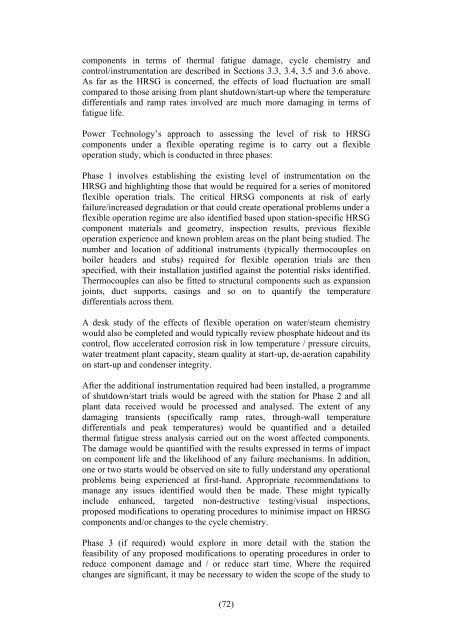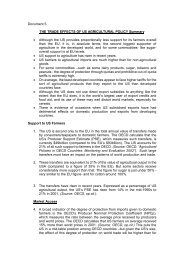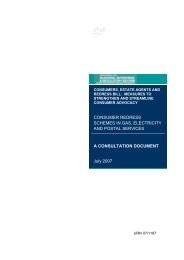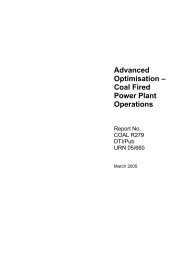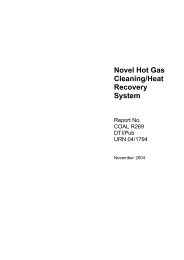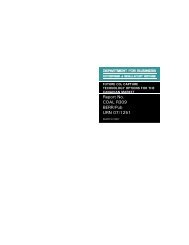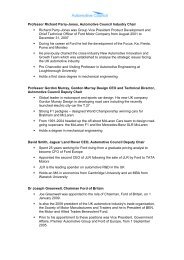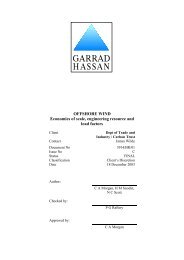(70) Therefore, the risk of sulphuric acid dew point attack ... - DTI Home
(70) Therefore, the risk of sulphuric acid dew point attack ... - DTI Home
(70) Therefore, the risk of sulphuric acid dew point attack ... - DTI Home
Create successful ePaper yourself
Turn your PDF publications into a flip-book with our unique Google optimized e-Paper software.
components in terms <strong>of</strong> <strong>the</strong>rmal fatigue damage, cycle chemistry and<br />
control/instrumentation are described in Sections 3.3, 3.4, 3.5 and 3.6 above.<br />
As far as <strong>the</strong> HRSG is concerned, <strong>the</strong> effects <strong>of</strong> load fluctuation are small<br />
compared to those arising from plant shutdown/start-up where <strong>the</strong> temperature<br />
differentials and ramp rates involved are much more damaging in terms <strong>of</strong><br />
fatigue life.<br />
Power Technology’s approach to assessing <strong>the</strong> level <strong>of</strong> <strong>risk</strong> to HRSG<br />
components under a flexible operating regime is to carry out a flexible<br />
operation study, which is conducted in three phases:<br />
Phase 1 involves establishing <strong>the</strong> existing level <strong>of</strong> instrumentation on <strong>the</strong><br />
HRSG and highlighting those that would be required for a series <strong>of</strong> monitored<br />
flexible operation trials. The critical HRSG components at <strong>risk</strong> <strong>of</strong> early<br />
failure/increased degradation or that could create operational problems under a<br />
flexible operation regime are also identified based upon station-specific HRSG<br />
component materials and geometry, inspection results, previous flexible<br />
operation experience and known problem areas on <strong>the</strong> plant being studied. The<br />
number and location <strong>of</strong> additional instruments (typically <strong>the</strong>rmocouples on<br />
boiler headers and stubs) required for flexible operation trials are <strong>the</strong>n<br />
specified, with <strong>the</strong>ir installation justified against <strong>the</strong> potential <strong>risk</strong>s identified.<br />
Thermocouples can also be fitted to structural components such as expansion<br />
joints, duct supports, casings and so on to quantify <strong>the</strong> temperature<br />
differentials across <strong>the</strong>m.<br />
A desk study <strong>of</strong> <strong>the</strong> effects <strong>of</strong> flexible operation on water/steam chemistry<br />
would also be completed and would typically review phosphate hideout and its<br />
control, flow accelerated corrosion <strong>risk</strong> in low temperature / pressure circuits,<br />
water treatment plant capacity, steam quality at start-up, de-aeration capability<br />
on start-up and condenser integrity.<br />
After <strong>the</strong> additional instrumentation required had been installed, a programme<br />
<strong>of</strong> shutdown/start trials would be agreed with <strong>the</strong> station for Phase 2 and all<br />
plant data received would be processed and analysed. The extent <strong>of</strong> any<br />
damaging transients (specifically ramp rates, through-wall temperature<br />
differentials and peak temperatures) would be quantified and a detailed<br />
<strong>the</strong>rmal fatigue stress analysis carried out on <strong>the</strong> worst affected components.<br />
The damage would be quantified with <strong>the</strong> results expressed in terms <strong>of</strong> impact<br />
on component life and <strong>the</strong> likelihood <strong>of</strong> any failure mechanisms. In addition,<br />
one or two starts would be observed on site to fully understand any operational<br />
problems being experienced at first-hand. Appropriate recommendations to<br />
manage any issues identified would <strong>the</strong>n be made. These might typically<br />
include enhanced, targeted non-destructive testing/visual inspections,<br />
proposed modifications to operating procedures to minimise impact on HRSG<br />
components and/or changes to <strong>the</strong> cycle chemistry.<br />
Phase 3 (if required) would explore in more detail with <strong>the</strong> station <strong>the</strong><br />
feasibility <strong>of</strong> any proposed modifications to operating procedures in order to<br />
reduce component damage and / or reduce start time. Where <strong>the</strong> required<br />
changes are significant, it may be necessary to widen <strong>the</strong> scope <strong>of</strong> <strong>the</strong> study to<br />
(72)


